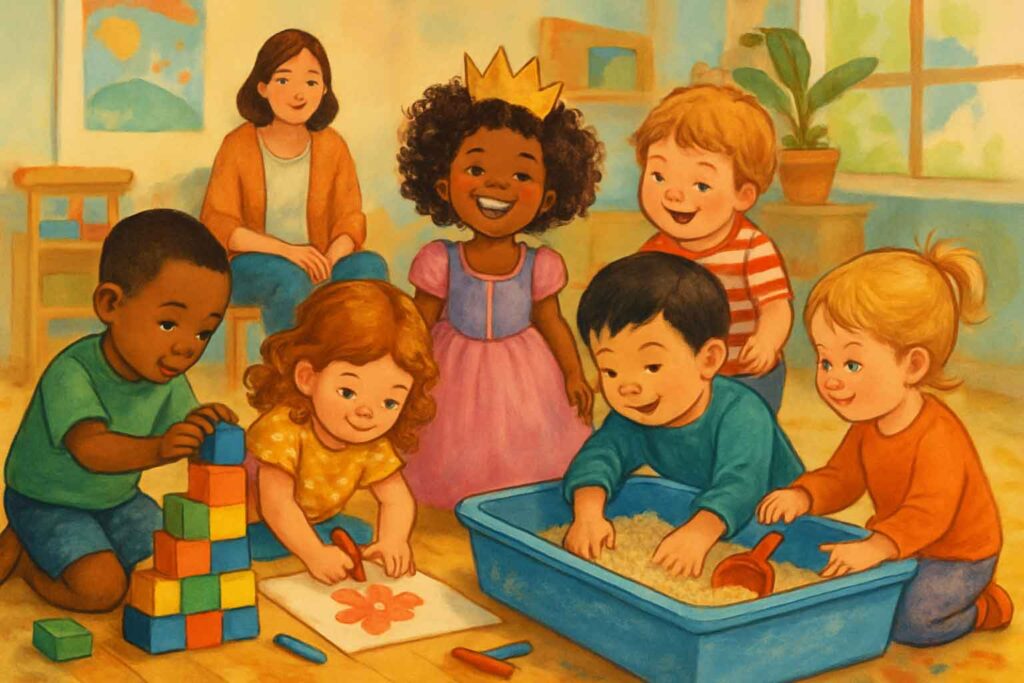Introduction
In an increasingly academic-focused world, the value of play in early childhood education is often underestimated. However, research consistently shows that play is not just a frivolous activity; it is a fundamental component of healthy development and effective learning for young children. Play-based learning environments provide children with opportunities to explore, discover, create, and solve problems in a natural and engaging way. This article will delve into why play-based learning is crucial for early childhood development, its numerous benefits, and how parents and educators can foster such an environment.
What is Play-Based Learning?
Play-based learning is an educational approach that emphasizes learning through play. It is child-initiated and child-directed, with adults acting as facilitators who support and extend children’s learning. Unlike traditional didactic methods, where information is directly transmitted from teacher to student, play-based learning allows children to construct their own understanding of the world around them through hands-on experiences and interactions. It can be structured (e.g., a teacher setting up a dramatic play area) or unstructured (e.g., free play in a sandbox).
Key Benefits of Play-Based Learning
Play-based learning offers a holistic approach to development, nurturing various aspects of a child’s growth:
1. Cognitive Development
Play is a powerful catalyst for cognitive growth. When children engage in play, they are constantly problem-solving, experimenting, and making sense of their environment. For example:
•Problem-Solving: Building a tower that keeps falling requires children to think about balance, gravity, and structural integrity.
•Critical Thinking: Deciding how to share toys or negotiate roles in a game fosters logical reasoning and decision-making.
•Creativity and Imagination: Pretend play, such as running a make-believe restaurant or exploring a fantasy world, stimulates imaginative thinking and abstract reasoning.
•Language and Literacy: Children develop vocabulary and narrative skills as they describe their play, tell stories, and interact with peers and adults.
•Mathematical Concepts: Sorting, counting, measuring, and recognizing patterns during play lay the groundwork for mathematical understanding.
2. Social and Emotional Development
Play provides a natural setting for children to develop crucial social and emotional skills:
•Cooperation and Collaboration: Group play requires children to work together, share, and compromise.
•Empathy and Perspective-Taking: Role-playing allows children to step into different shoes, understanding emotions and viewpoints other than their own.
•Conflict Resolution: Disagreements during play offer opportunities to learn negotiation and peaceful resolution strategies.
•Self-Regulation: Children learn to manage their emotions, control impulses, and follow rules within the context of play.
•Confidence and Self-Esteem: Successfully navigating play scenarios and achieving goals builds a sense of accomplishment and self-worth.
3. Physical Development
Both fine and gross motor skills are honed through play:
•Gross Motor Skills: Running, jumping, climbing, and balancing during outdoor play enhance coordination, strength, and agility.
•Fine Motor Skills: Manipulating small objects, drawing, cutting, and building with blocks improve dexterity and hand-eye coordination.
4. Language and Communication Skills
Play is inherently social and provides rich opportunities for language development:
•Vocabulary Expansion: Children learn new words as they describe their play, interact with others, and encounter new objects.
•Narrative Skills: Creating stories and scenarios during pretend play helps children develop coherent narratives and sequential thinking.
•Active Listening: Engaging in conversations during play encourages children to listen to and understand others.
Implementing Play-Based Learning at Home and in the Classroom
Creating an environment that supports play-based learning doesn’t require elaborate setups. It’s more about mindset and providing the right opportunities:
For Parents:
•Provide Open-Ended Materials: Offer toys and materials that can be used in multiple ways, such as blocks, art supplies, natural materials (leaves, sticks), and dress-up clothes.
•Follow Your Child’s Lead: Observe what interests your child and provide opportunities for them to explore those interests through play.
•Be a Facilitator, Not a Director: Instead of telling your child what to do, ask open-ended questions that encourage them to think and problem-solve (e.g., “What do you think will happen if…?”, “How could we make this work?”).
•Create a Safe and Stimulating Environment: Ensure your home has designated areas for play that are safe and allow for exploration without constant interruption.
•Join In (When Invited): Participate in play when your child invites you, but avoid taking over. Your role is to support and extend their play, not to control it.
For Teachers:
•Design Play-Rich Learning Centers: Create various centers in the classroom (e.g., dramatic play, block area, art station, sensory bin) that encourage different types of play and learning.
•Integrate Play into the Curriculum: Connect play activities to learning objectives. For example, a dramatic play area set up as a grocery store can teach about counting, money, and healthy eating.
•Observe and Document: Pay close attention to children’s play to understand their interests, strengths, and areas for growth. Use these observations to inform your teaching and planning.
•Provide Scaffolding: Offer support and guidance as needed, gradually withdrawing assistance as children become more capable. This could involve asking guiding questions, introducing new vocabulary, or suggesting new materials.
•Value Play: Communicate the importance of play to parents and administrators, explaining how it contributes to academic and holistic development.
Conclusion
Play-based learning is far more than just fun and games; it is a powerful and effective approach to early childhood education that lays a strong foundation for lifelong learning. By embracing play, we empower children to become curious, creative, resilient, and socially competent individuals. As parents and educators, our role is to champion play, providing the environments and support necessary for children to thrive through their most natural form of learning. Let’s recognize and celebrate the profound impact of play on the developing minds of our youngest learners.
